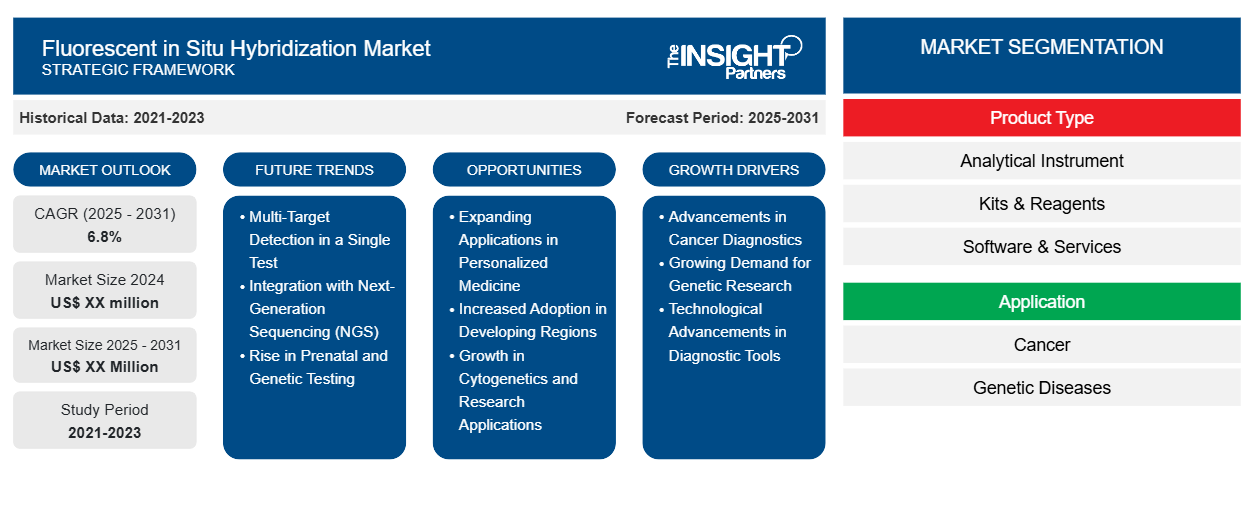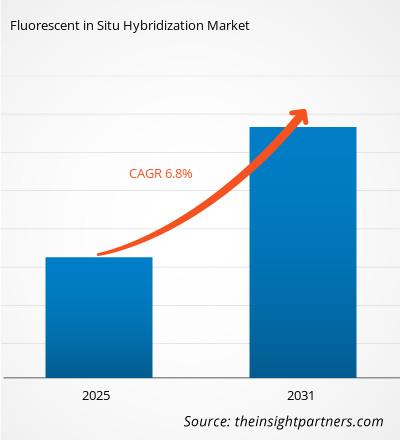The Fluorescent in Situ Hybridization Market is expected to register a CAGR of 6.8% from 2025 to 2031, with a market size expanding from US$ XX million in 2024 to US$ XX Million by 2031.
The report is segmented By Product Type (Analytical Instrument, Kits & Reagents, and Software & Services), Application (Cancer, Genetic Diseases, and Others). The global analysis is further broken-down at regional level and major countries. The Report Offers the Value in USD for the above analysis and segments.
Purpose of the Report
The report Fluorescent in Situ Hybridization Market by The Insight Partners aims to describe the present landscape and future growth, top driving factors, challenges, and opportunities. This will provide insights to various business stakeholders, such as:
- Technology Providers/Manufacturers: To understand the evolving market dynamics and know the potential growth opportunities, enabling them to make informed strategic decisions.
- Investors: To conduct a comprehensive trend analysis regarding the market growth rate, market financial projections, and opportunities that exist across the value chain.
- Regulatory bodies: To regulate policies and police activities in the market with the aim of minimizing abuse, preserving investor trust and confidence, and upholding the integrity and stability of the market.
Fluorescent in Situ Hybridization Market Segmentation
Product Type
- Analytical Instrument
- Kits & Reagents
- Software & Services
Application
- Cancer
- Genetic Diseases
Customize This Report To Suit Your Requirement
Get FREE CUSTOMIZATIONFluorescent in Situ Hybridization Market: Strategic Insights

-
Get Top Key Market Trends of this report.This FREE sample will include data analysis, ranging from market trends to estimates and forecasts.
Fluorescent in Situ Hybridization Market Growth Drivers
- Advancements in Cancer Diagnostics: Fluorescent in situ hybridization (FISH) is increasingly used in cancer diagnostics, particularly in detecting chromosomal abnormalities and gene rearrangements. As cancer research advances, FISH offers a precise method for identifying specific mutations, driving its demand in oncology. The increasing prevalence of cancer globally and the need for early and accurate detection further fuels market growth.
- Growing Demand for Genetic Research: The rising focus on genetic research and personalized medicine is a key driver for the FISH market. FISH enables the detection of genetic disorders, mutations, and structural variations, playing a vital role in genomics and precision medicine. With the growing importance of understanding genetic predispositions for disease, the demand for FISH in research continues to rise.
- Technological Advancements in Diagnostic Tools: Technological improvements in FISH equipment and probe development are expanding its applications in clinical diagnostics. Enhanced sensitivity, improved imaging technologies, and the ability to analyze multiple targets simultaneously are driving the growth of the FISH market. These innovations are enabling better diagnostic accuracy, particularly in genetic testing and cytogenetics, making FISH a preferred tool in medical diagnostics.
Fluorescent in Situ Hybridization Market Future Trends
- Multi-Target Detection in a Single Test: A notable trend in the FISH market is the increasing use of multi-target detection in a single test. Advances in FISH technology now allow the simultaneous detection of multiple genetic markers, improving efficiency in diagnostics. This trend is gaining popularity in oncology and genetic research, where multiple chromosomal abnormalities need to be detected quickly and accurately.
- Integration with Next-Generation Sequencing (NGS): The integration of FISH with next-generation sequencing (NGS) technology is a growing trend. Combining the precise localization of genetic markers with the high throughput of NGS provides a comprehensive approach to genetic analysis. This trend is expected to enhance the capabilities of FISH, making it a more powerful tool for research, diagnostics, and clinical decision-making.
- Rise in Prenatal and Genetic Testing: As prenatal and genetic testing becomes more widespread, FISH is increasingly being used to detect chromosomal abnormalities such as Down syndrome and other genetic disorders. The trend toward non-invasive prenatal testing (NIPT) and genetic screening is driving the adoption of FISH for its accuracy in identifying specific genetic conditions, particularly in early-stage testing.
Fluorescent in Situ Hybridization Market Opportunities
- Expanding Applications in Personalized Medicine: The growing focus on personalized medicine presents a significant opportunity for the FISH market. FISH's ability to detect specific genetic mutations and chromosomal abnormalities makes it valuable in developing targeted therapies, especially in oncology. As personalized treatments become more common, FISH can play a crucial role in identifying the genetic markers that guide treatment decisions.
- Increased Adoption in Developing Regions: There is a significant opportunity for growth in developing regions where access to advanced diagnostic tools is expanding. As healthcare infrastructure improves in regions such as Asia and Africa, the adoption of FISH technology is likely to increase, particularly in the detection of genetic disorders and cancers, creating a large untapped market for diagnostic companies.
- Growth in Cytogenetics and Research Applications: The increasing demand for cytogenetic testing and genetic research presents an opportunity for the FISH market. FISH is widely used in the detection of chromosomal abnormalities, genetic disorders, and gene mapping. As research in genomics and gene therapy accelerates, the need for FISH technology to explore genetic variations and anomalies will continue to grow, driving further opportunities.
Fluorescent in Situ Hybridization Market Regional Insights
The regional trends influencing the Fluorescent in Situ Hybridization Market have been analyzed across key geographies.
Fluorescent in Situ Hybridization Market Report Scope
| Report Attribute | Details |
|---|---|
| Market size in 2024 | US$ XX million |
| Market Size by 2031 | US$ XX Million |
| Global CAGR (2025 - 2031) | 6.8% |
| Historical Data | 2021-2023 |
| Forecast period | 2025-2031 |
| Segments Covered |
By Product Type
|
| Regions and Countries Covered |
North America
|
| Market leaders and key company profiles |
|
Fluorescent in Situ Hybridization Market Players Density: Understanding Its Impact on Business Dynamics
The Fluorescent in Situ Hybridization Market is growing rapidly, driven by increasing end-user demand due to factors such as evolving consumer preferences, technological advancements, and greater awareness of the product's benefits. As demand rises, businesses are expanding their offerings, innovating to meet consumer needs, and capitalizing on emerging trends, which further fuels market growth.

Key Selling Points
- Comprehensive Coverage: The report comprehensively covers the analysis of products, services, types, and end users of the Fluorescent in Situ Hybridization Market, providing a holistic landscape.
- Expert Analysis: The report is compiled based on the in-depth understanding of industry experts and analysts.
- Up-to-date Information: The report assures business relevance due to its coverage of recent information and data trends.
- Customization Options: This report can be customized to cater to specific client requirements and suit the business strategies aptly.
The research report on the Fluorescent in Situ Hybridization Market can, therefore, help spearhead the trail of decoding and understanding the industry scenario and growth prospects. Although there can be a few valid concerns, the overall benefits of this report tend to outweigh the disadvantages.
Frequently Asked Questions
/
country-wise market wherein 2021-2023 are the historic years, 2024 is considered to be the base year, and the forecast will be provided till 2031, along with CAGR (%)
- Historical Analysis (2 Years), Base Year, Forecast (7 Years) with CAGR
- PEST and SWOT Analysis
- Market Size Value / Volume - Global, Regional, Country
- Industry and Competitive Landscape
- Excel Dataset
Recent Reports
Testimonials
Reason to Buy
- Informed Decision-Making
- Understanding Market Dynamics
- Competitive Analysis
- Identifying Emerging Markets
- Customer Insights
- Market Forecasts
- Risk Mitigation
- Boosting Operational Efficiency
- Strategic Planning
- Investment Justification
- Tracking Industry Innovations
- Aligning with Regulatory Trends







 Get Free Sample For
Get Free Sample For